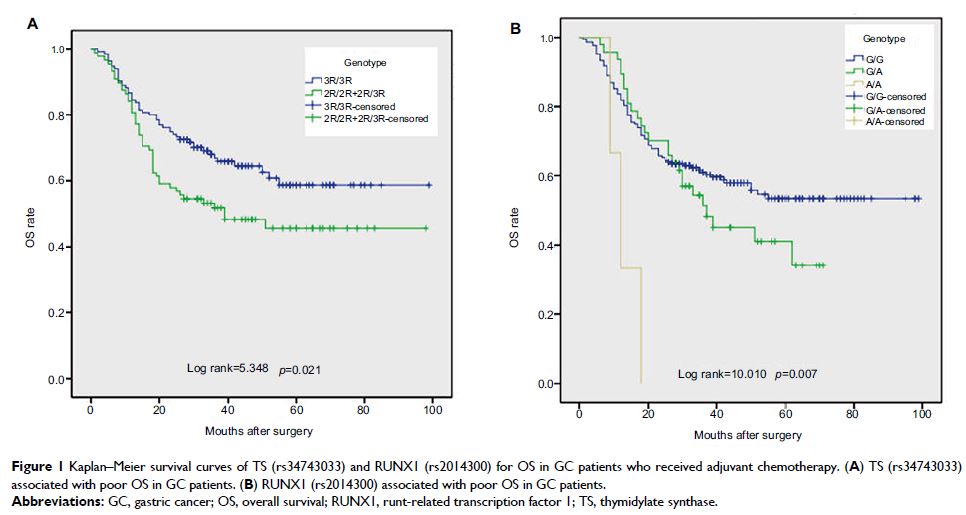108384
论文已发表
注册即可获取德孚的最新动态
IF 收录期刊
- 3.4 Breast Cancer (Dove Med Press)
- 3.2 Clin Epidemiol
- 2.6 Cancer Manag Res
- 2.9 Infect Drug Resist
- 3.7 Clin Interv Aging
- 5.1 Drug Des Dev Ther
- 3.1 Int J Chronic Obstr
- 6.6 Int J Nanomed
- 2.6 Int J Women's Health
- 2.9 Neuropsych Dis Treat
- 2.8 OncoTargets Ther
- 2.0 Patient Prefer Adher
- 2.2 Ther Clin Risk Manag
- 2.5 J Pain Res
- 3.0 Diabet Metab Synd Ob
- 3.2 Psychol Res Behav Ma
- 3.4 Nat Sci Sleep
- 1.8 Pharmgenomics Pers Med
- 2.0 Risk Manag Healthc Policy
- 4.1 J Inflamm Res
- 2.0 Int J Gen Med
- 3.4 J Hepatocell Carcinoma
- 3.0 J Asthma Allergy
- 2.2 Clin Cosmet Investig Dermatol
- 2.4 J Multidiscip Healthc

TS(rs34743033)和RUNX1(rs2014300)基因多态性对接受基于氟尿嘧啶的化疗治疗的中国晚期胃癌患者生存率结果的影响
Authors Han R, Wei J, Zhang H, Su X, Chu X, Chen Y, Gong Y, Wang X, Shi J, Chen J
Received 1 December 2017
Accepted for publication 9 April 2018
Published 6 June 2018 Volume 2018:10 Pages 1429—1437
DOI https://doi.org/10.2147/CMAR.S158647
Checked for plagiarism Yes
Review by Single-blind
Peer reviewers approved by Dr Cristina Weinberg
Peer reviewer comments 2
Editor who approved publication: Professor Kenan Onel
Background: This study aimed to explore the clinical correlation of
single-nucleotide polymorphisms of thymidylate synthase (TS) and runt-related
transcription factor 1 (RUNX1) in patients with postoperative stage II and III
gastric cancer (GC).
Patients and
methods: Samples were obtained from 661
patients with postoperative stage II and III GC. TS (rs34743033) and RUNX1
(rs2014300) were genotyped in 261 patients who received postoperative basic
platinum and fluorouracil chemotherapy regimens and 400 patients who did not
accept chemotherapy.
Results: TS (rs34743033) variant genotypes significantly prolonged the
median overall survival (OS) time compared to the patients who only received
adjuvant chemotherapy (HR 1.604, 95% CI 1.068–2.410, p =0.021). Moreover, 3R/3R variant
genotypes were demonstrated to have a positive effect on the OS of patients who
received chemotherapy based on cisplatin (HR 1.754, 95% CI 1.041–2.954, p =0.031) compared to oxaliplatin.
A stratification analysis indicated that 2R/3R and 2R/2R variant genotypes were
associated with inferior survival in GC patients with intestinal-type tumors,
tumor less than 5 cm in size, and poorly differentiated tumors (p <0.05). However, RUNX1
(rs2014300) AA genotypes markedly increased the risk of death in GC patients
compared with the GG/GA genotypes (p =0.007), but no
significant difference was observed between chemotherapy based on platinum. The
stratification analysis showed that the GA/AA genotype was significantly
associated with inferior survival in well to moderately differentiated tumors
(HR 2.001, 95% CI 1.082–3.703, p =0.023).
Conclusion: These preliminary results indicated that the two polymorphisms had a
significant effect on postoperative adjuvant chemotherapy. TS (rs34743033) and
RUNX1 (rs2014300) may be used as biomarkers to predict prognosis and select
chemotherapy regimens in GC patients.
Keywords: thymidylate synthase, runt-related transcription factor 1,
single-nucleotide polymorphisms, adjuvant chemotherapy, gastric cancer
